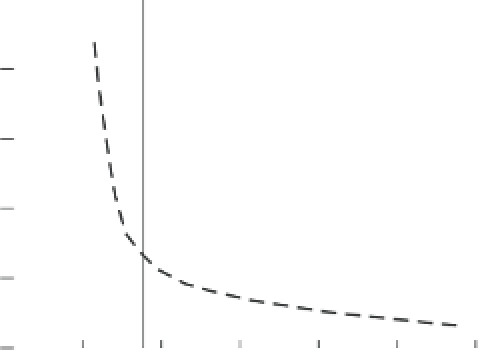Geology Reference
In-Depth Information
10
8
Basic dyke
Host granite
6
log (
η
)
4
2
0
850
900
950
1000
1050
1100
1150
T (degree C)
Figure 9.1
Variations of log viscosity
(in Pascal seconds) as a function of
temperature for two magma types corresponding to basalt and granite (s.l.) The
temperature where both magmas reach local thermal equilibrium (about 940
◦
C)
corresponds to a viscosity inversion, below which the originally more viscous
granitic magma tracks the viscosity increase of the basaltic one. In this model
calculation, the local equilibrium temperature corresponds to a crystal content
of about 20% for the granite and 40% for the basic magma. The closer both
magmas are to the inversion temperature, the easier it becomes for them to mix
and blend as opposed to mingle.
η
between the two parents. An example would be basalt and rhyolite mixing
together to make andesite. Just in the same way that oil and water don't mix,
no matter how hard you stir, so it is with magmas where contrasting density
and viscosity ratios prevent it. In magmas where these contrasts are low it is
possible for mixing and blending to occur. Where the viscosity contrast remains
high, magmas are effectively immiscible and co-exist as discrete entities with
little chemical interaction, although material interaction in the form of crys-
tal exchange is still possible. The timescale of cooling is an important factor
controlling the degree of interaction and mixing, as is the volume of mingling
material and the deformation history. Very fast cooling rates will inhibit mix-
ing but shearing, if accompanied by stretching and folding of interacting fluids
will enhance their ability to blend and homogenise by increasing the contact
surface area available for chemical and thermal diffusion. This type of interac-
tion is likely to be most effective when magma is flowing at speed in narrow
dikes or conduits. Where magma mixing is suspected in the field, this can be
tested in the laboratory using geochemistry, as whole rock major oxides and























